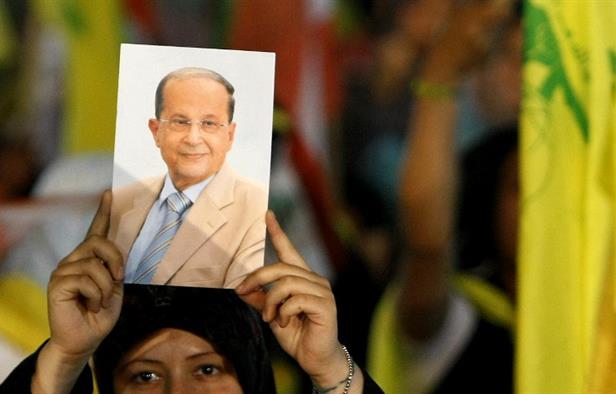Hezbollah’s Achilles heel
Michael Young/Now Lebanon/February 25/16
The Saudi decision to cut funding for the Lebanese army and security forces has been puzzling. As the Lebanese have absorbed the shock of this and subsequent Saudi and Gulf measures, they have wondered what it is they’re supposed to do.
Ambiguity can be useful, because it tends to force the target of one’s sanctions to over-interpret what needs to be done to fall back into line. But even there the Saudi move has caused consternation, and the way it has been interpreted by pro-Saudi commentators is that the kingdom wishes to isolate Hezbollah.
But is denying the army weapons the way to do so? How does one explain the fact that the Saudis promised the Lebanese army military aid in December 2013, at a moment not strikingly different than today? Hezbollah was deployed in Syria then and security threats in the country were on the rise. The decision was interpreted as, mainly, a reward to France, the intended supplier in the arrangement, because its government had taken a hard line with Iran in negotiations over a nuclear accord.
What has really changed to merit a turnaround? On top of that Lebanon is in a very dangerous place today, on the edge economically. Pushing it over would very likely create a massive humanitarian crisis and great instability, with some 1.5 million Syrian refugees in the country. This could precipitate a domestic sectarian conflict with dramatic repercussions. The country might not only attract extremists as has Syria, but could turn into the source of a new migration crisis affecting Europe.
That’s the nightmare scenario at least, and the indications are that both the United Nations and some European states are warning the Saudis against pushing Lebanon too far. It appears, at least for now, that this is not Riyadh’s intention. The kingdom realizes that there is considerable opposition to Hezbollah in Lebanon, and that, for example, expelling Lebanese workers from the Gulf states would simply undermine its own Lebanese sympathizers while opening a golden door to Iran.
For a better sense of what the Saudis want, the French-language L’Orient-Le Jour this week spoke to Jamal Khashoggi, a Saudi journalist with very close ties to the regime. “Saudi Arabia is not withdrawing from Lebanon,” he told the newspaper. “Saudi Arabia had agreed with the countries of the region, notably Iran, to freeze the situation in Lebanon in order to spare it the repercussions of the situation in Syria. That equation is now being challenged, since Saudi Arabia has become the only guarantor of the stability of a country that has become a base of support for Iran’s policies, implemented by Hezbollah.”
Khashoggi went on to say, “The key message, it seems to me, is that Saudi Arabia must not be taken for granted.”
While it’s true that Hezbollah has had free rein in Lebanon in recent years–prolonging the presidential vacuum and acting with impunity on many fronts—it’s unclear how the party’s adversaries can respond to an armed organization that never hesitates to resort to violence. The Saudis do not desire a Sunni-Shiite civil war in Lebanon, that much appears to be evident.
This means they prefer a political initiative, one that involves putting Hezbollah into the corner. What we can expect in the coming period is a harder line by March 14, which will make the country even more dysfunctional than it already is. The objective is to make all Hezbollah moves more costly and difficult.
Oddly enough, the wild card in all this is Michel Aoun, who has been left unmentioned in the latest saga, except for the fact that his son-in-law provoked Saudi ire. It must have dawned on the general by now that Hezbollah has refused to ensure his election as president, even though it could easily do so by persuading its ally Nabih Berri to swing his bloc’s votes behind the general.
For a man who sided with Hezbollah against the parliamentary majority because he thought it would get him elected, the party’s behavior must be deeply disconcerting. How long will Aoun remain silent? If he could persuade the Saudis and his Sunni counterparts that his presidency would not serve Iran’s interests, a consensus around Aoun could ensure that the presidential vacuum prolonged by Hezbollah is finally filled.
For now, however, Aoun is regarded by the Saudis as a Hezbollah peon. Yet the only realistic way to isolate Hezbollah is for the Saudis to persuade Aoun to take his distance from the party. Khashoggi pointedly remarked, “The Free Patriotic Movement, Hezbollah’s ally, is providing cover for a project that does not resemble it. What unites the FPM with wilayat al-faquih?”
Was that an invitation for Aoun to realign? Khashoggi has no official capacity, but he is privy to the thinking in the Saudi leadership. Would the Saudis reconsider their views of Aoun were he to take a more centrist position, with the result that Hezbollah could find itself without a strong Christian partner?
That cannot be ruled out. As Aoun becomes more frustrated with the absence of backing from Hezbollah for his presidential bid, he may be tempted to shift. The Saudis have now made the equation more stark than ever. They want Hezbollah to stand alone and Aoun is the party’s potential Achilles heel. Without him its agenda could be crippled. Aoun may sense an opportunity.
**Michael Young is opinion editor of The Daily Star newspaper. He tweets @BeirutCalling.
https://now.mmedia.me/lb/en/commentaryanalysis/566658-hezbollahs-achilles-heel



















